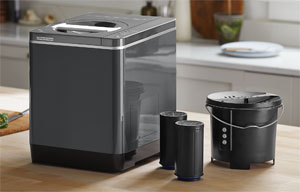County could save money on waste if residents bought pricey but slick FoodCycler machine
Administrator | Mar 09, 2022 | Comments 6
C ounty council is being tempted that it can reduce garbage tonnage fees and reduce methane gas in landfill sites by helping residents get scrappy with a pricey, but slick, food waste machine.
ounty council is being tempted that it can reduce garbage tonnage fees and reduce methane gas in landfill sites by helping residents get scrappy with a pricey, but slick, food waste machine.
Following Tuesday night’s meeting, councillors have asked staff to explore details and the viability of the pilot program.
Christina Zardo told council that FoodCycler Municipal Solutions could help the County subsidize residents’ use of the indoor composter in a pilot project.
She recommends the County pay a subsidy of $25,000 for 200 households (plus shipping and taxes) that would allow residents to purchase the $500 machines for $175. There could be a 10 per cent availabilty for $50 machines to help people in need of assistance to purchase.
Grants from the Green Municipal Fund and others, Zardo notes, are also available.
Councillor Phil Prinzen asked how the County would encourage residents to buy the unit when they can use the green bin free of charge.
Zados said the device is directed at those who do not like using green bins and is especially popular with those who live in apartments.
Participants would use the machine for 12 weeks, and fill out an exit survey providing feedback. Following, they can keep the machine.
With the bread-maker sized appliance, food scraps are turned into a compost in an average of five hours that can then be added to soil (as an amendment, not in lieu of compost).
The municipality’s benefit, Zardo noted, is the reduction of food waste going to landfill where methane gas builds and needs to be modified.
Zardo’s presentation states 63 per cent of food waste is avoidable and that household waste is composed of approximately 25-50 per cent organics.
“Each year, food waste in Canada is responsible for 56.6 million tonnes of CO2” and “landfill organic waste produces methane which is 25 times more harmful than CO2. One tonne of food waste is equivalent to one car on the road for one year.”
Green bins, backyard compost and landfill aren’t solving the problem, she stated.
Green bins are the preferred solution for larger cities where dense housing and large processing facilities generate economies of scale. Zardo adds contamination is an ongoing challenge.
Backyard composters are cost-effective, but labour-intensive. Users don’t like composting in winter or in poor weather and that if not done correctly, can attract pests, animals and odours.
Landfill is the easiest solution out-of-sight, out-of-mind for consumers but there are high emissions, particularly methane and have a long-term environmental hazard requiring monitoring and maintenance.
The machine claims to process anything people currently put in their green bin or home compost pile, including fruit and vegetable peels, bread, nuts, eggshells, starches, coffee grounds, wilted flowers, fish and poultry bones (meat not recommended if people intend to use the fertilizer in their garden).
The bucket holds about two litres of waste – about the amount a family of five might create from one home-cooked meal. Vitamix claims breaking down about 90 per cent of the food takes approximately four to eight hours and creates one or two cups of fertilizer.
The website claims there is no smell, but also sells replacement filters for $30 as well as ‘foodlizer’ tablets for $30 and a lid filter for $17. Replacement bucket and lid is $100.
Filed Under: News from Everywhere Else
About the Author:



































I was so keen when I first heard about this technology. That changed. I have friends who uses this type of machine. They call it a “potpourri maker“ because it basically just dehydrates. The pieces do not break down very well, often resulting in ‘recomposting’. You cannot put in paper towel (which is accepted in green bins). Not being able to put in meat byproducts is problematic. The amount of electricity used is counterproductive. And then what do you do with all the things you can’t put in? People end up throwing them out or still having to use the green bin.
From: https://www.choice.com.au/outdoor/gardening/products-and-advice/articles/breville-the-foodcycler-review
Breville’s ‘The FoodCycler’ delivers in terms of reducing waste, turning your household waste into ‘EcoChips’. But based on its running costs and the cost for replacement filters (which adds up to over $300 a year), we don’t recommend this product. Any benefits for the environment are offset by the electricity costs and the contribution you’re making to landfill with the replacement filters. You can achieve the same results through simple composting.
And just how much power do these units consume…?
Brilliant idea. My green bin stinks so I don’t use it. I would use this.
This is basically a marketing ploy for Vitamix branded composting machines. This is not something that tax dollars should fund.
Love it!!!